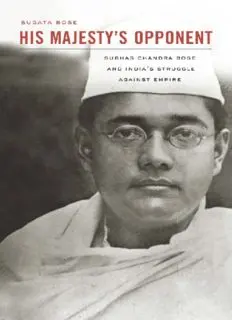
His Majesty's Opponent: Subhas Chandra Bose and India's Struggle Against Empire PDF
Preview His Majesty's Opponent: Subhas Chandra Bose and India's Struggle Against Empire
HIS MAJESTY’S OPPONENT HIS MAJESTY’S OPPONENT SUBHAS CHANDRA BOSE AND INDIA’S STRUGGLE AGAINST EMPIRE Sugata Bose the belknap press of harvard university press Cambridge, Massachusetts, and London, Eng land n 2011 Copyright © 2011 by the President and Fellows of Harvard College All rights reserved Printed in the United States of America Library of Congress Cataloging-i n- Publication Data Bose, Sugata. His majesty’s opponent : Subhas Chandra Bose and India’s struggle against empire / Sugata Bose. p. cm. Includes bibliographical references and index. ISBN 978- 0- 674- 04754- 9 (alk. paper) 1. Bose, Subhas Chandra, 1897–1945. 2. Nationalists—India— Biography. 3. Statesmen—India—Biography. 4. India—Politics and government—1919–1947. I. Title. DS481.B6B68 2011 954.03′5092—dc22 [B] 2010038250 In honor of Sisir Kumar Bose (1920–2000) Contents Preface ix 1 A Flaming Sword Forever Unsheathed 1 2 God’s Beloved Land 15 3 Dreams of Youth 45 4 Exile in Europe 85 5 The Warrior and the Saint 135 6 One Man and a World at War 180 7 The Terrible Price of Freedom 201 8 Roads to Delhi 238 9 A Life Immortal 304 Notes 329 Index 371 Preface Subhas Chandra Bose was an uncle of my father, Sisir Kumar Bose, and a young er brother of my paternal grandfather, Sarat Chandra Bose. I never met Subhas Chandra Bose, since he passed from the scene in 1945, a good eleven years before I was born. I never met Sarat Chandra Bose either; he died in 1950. Growing up during the early de cades of in de pen dent India, I knew them not as relatives but as historical public figu res. Like millions of other South Asians, I thought of Subhas Chan- dra Bose as Netaji—“Revered Leader”—one of those who spearheaded India’s freedom struggle. I was also aware of how controversial he was in the West, because of his wartime alliances. According to my father, Netaji believed that his family was coterminous with his country. I was taught, from childhood, never to claim a special relationship with him based on an accident of birth. Though I belong to a generation that never knew Netaji in person, I had the opportunity to meet the men and women who had worked closely with him. They were frequent visitors and guests at my family’s home in Calcutta, first at 1 Woodburn Park, and after 1974 at 90 Sarat Bose Road (the house we called “Basundhara”). Sitting on the veran- dah of Woodburn Park, I heard Abid Hasan recount the thrilling story
